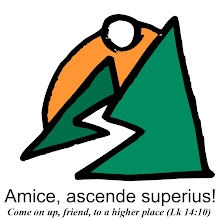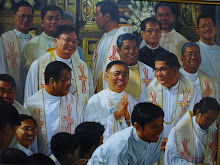
Lenten Reflection / Sunday Worship Guide
I would like to think that today’s liturgy may be understood as a call to reflect on three basic themes: renewal, authenticity, and interiority. The prophet Jeremiah speaks of the new covenant that will be forged between Yahweh and the house of Israel.That new covenant, we are told, is connected with Yahweh’s overriding mercy and forgiveness. The New Law, we are told further, is to be written not in stone, but is meant to be placed within us and written upon[our] hearts (Jer 31:33).
The letter to the Hebrews, along with the second part of John’s gospel passage, both allude unmistakably to the agony of Jesus in the garden of Gethsemani, and his subsequent suffering “in the flesh,” a very real and authentic journey of suffering and death that is at the root of the eternal salvation that awaits all believers.
The same Gospel passage from John gives us a glimpse of the interior struggle experienced by Jesus as he agonized in the garden, and the subsequent triumph of obedience to the Father’s will that ensued from that intense interior communing with the Father, when “he offered prayers and supplications with loud cries and tears to the one who was able to save him from death” (Heb 5:7).
We are all partakers now of this new covenant. We are sons and daughters of this renewal that has become a reality in the coming of Christ in our lives. But what was prophesied of old still has to unfold and become a reality in our individual and communal lives. We are all called to constant renewal, to constant purification, to continuing conversion. But for renewal to take place, there has to be a counterpart from our side of the covenant. We need to make the Law our own. We need to allow it to be written in our hearts. This is a call to authenticity and interiority. This is a call to act like Christ who “son though he was, learned obedience from what he suffered” (Heb 5:8). This is a call to be like Christ in his total acceptance of and resignation to his Father’s will: “But it was for this purpose that I came to this hour. Father, glorify your name” (Jn 12:27).
How many times have we been told about our tendency as Filipinos to settle for mere externals, our penchant for form and image rather than substance? How many times have we been reminded about our propensity to be good debaters and glib talkers, but after all the sound and fury of our rhetoric, there is little in terms of action that we can show? The Philippines have produced among the best laws all over the world in terms of ecology and other relevant issues, but problems on those issues continue to plague us. Surely, there is something disturbing at the dawning realization we are having, that Asia’s only Christian nation, also happens to be among the most corrupt and graft-ridden. The last two national youth surveys confirm each other in this disturbing trend: the famed religiosity of the Filipino as we know it is fast disappearing. And in its place, we see a lot of media-mediated values like consumerism, hedonism and relativism, as shown for example by the tenuous appreciation for, if not downright refusal from an increasing number of Filipinos of the Church’s official moral teachings.Seventeen years after the Second Plenary Council of the Philippines, we can only beat our breast at the painful realization that evangelization has failed miserably in many senses! All this just shows that renewal, authenticity and interiority are things we cannot take lightly in our journey of faith as Christians and Catholics.




